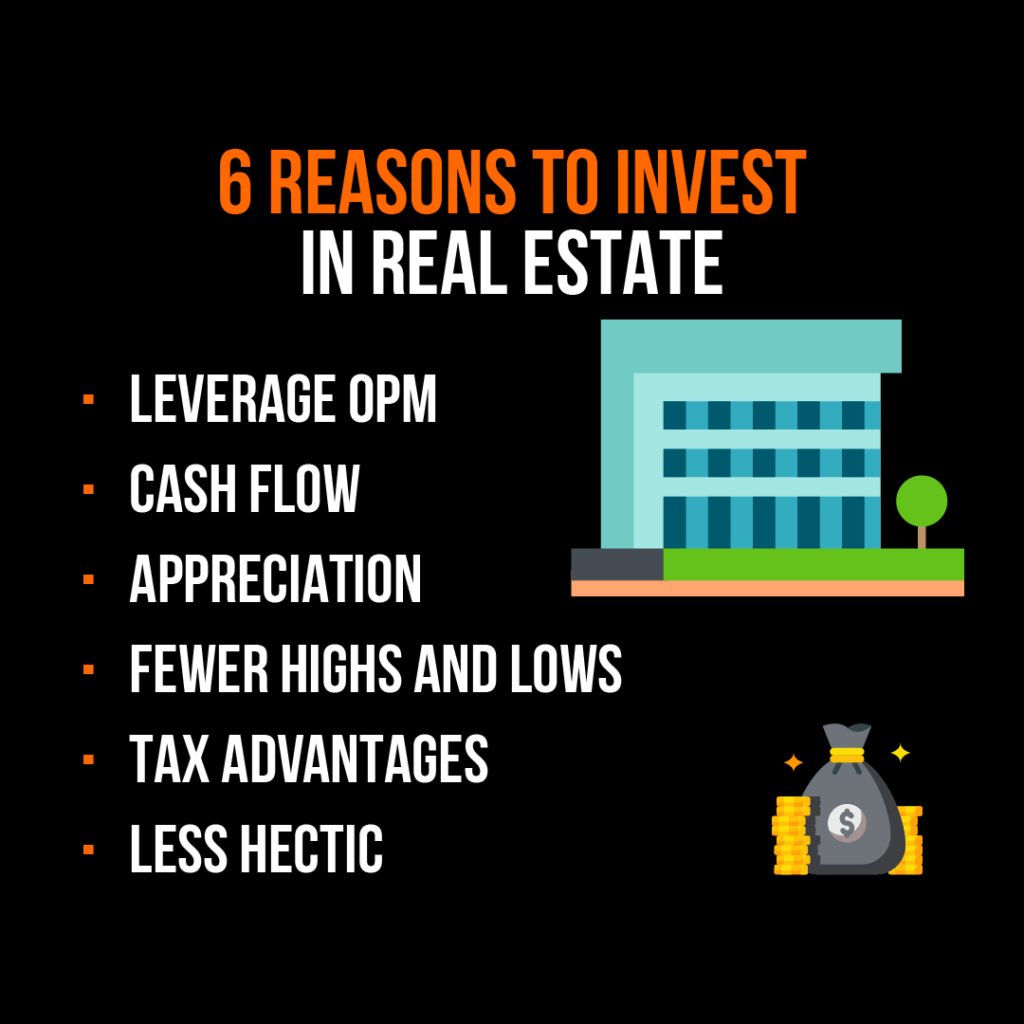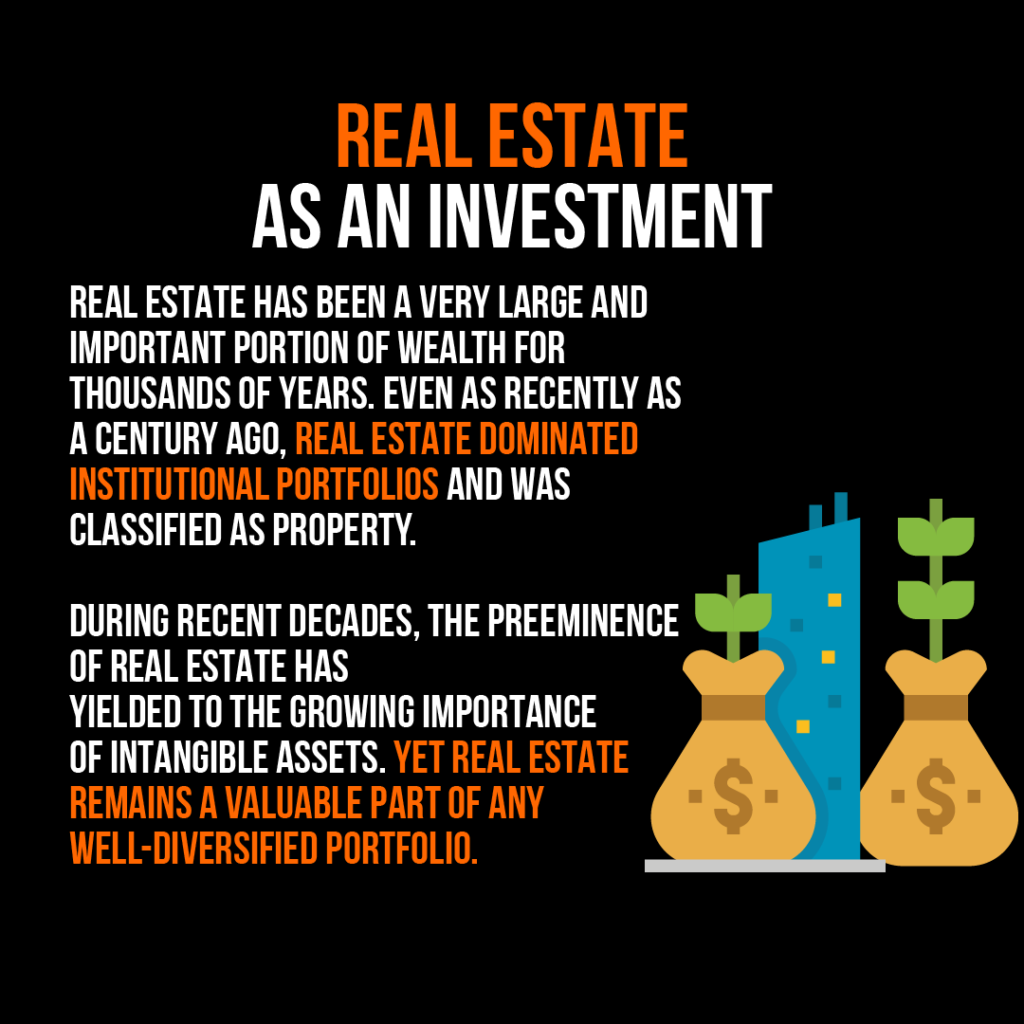Why invest in Real Estate
Why invest in real estate
Investing is one of the most important things to become financially independent or build assets.
You can invest in multiple financial instruments, but today we are focusing on real estate, and we will help you decide if real estate investing is for you or not.

Benefits of Real Estate Investing
- Can be a source of steady income
The majority of the people investing in real estate look for the steady cashflow real estate investing brings with it in rental income.
This passive income is maybe the biggest benefit of real estate investing and certainly a thing to consider. Depending on the location, you could be earning a significant amount of rent to cover your expenses and then some profit, which is known as positive cash flow.
You could always invest in more than one property, thus increasing your net worth
tremendously.
One tip to keep in mind is location, location, location is the key to smart real estate investing.

- Real estate appreciation (Asset Appreciation)
On the off chance that you are in real estate investing or are simply beginning, you need to comprehend that real estate is certainly not a short term plan. Actually, the advantages of putting money into real estate incorporate the appreciation for land after some time. At the end of the day, your property’s worth will generally be worth way more a long time from now, subsequently why investors are in it for the since quite a while ago run.
- Inflation
One of the advantages of putting money into real estate is to protect against inflation. With high inflation, your rental pay and property value increases by a lot.
Real estate investors like inflation because as the cost of living goes up, the investor’s cash flow goes up. While on the other hand, savers shun inflation.
- Tax Benefits
Investing in real estate will help you a lot in taxes because governments give an extreme amount of tax benefits to the investors investing in real estate. The government also offers tax breaks for property depression, insurance, maintenance repairs, travel expenses, legal fees, and property taxes.
Real estate investors are also entitled to lower tax rates for their long term investments.
- Long Term Financial Stability
Investing in real estate provides investors with long term financial stability. When you have a steady cash flow with maybe a positive equity (home value more than mortgage value), then you can rest assured. If something unfortunate happens to your job, you will have the cash flow from the property to fall back on.
You can invest in real estate by getting a bank loan, thus providing you with something called leverage. Leverage is the use of borrowed capital to increase the potential return of an investment.
Using leverage, you can get a much higher price property than you would have otherwise been affording had you had to give the entire payment upfront.
The annual return on a $400,000 property with a $40,000 net cash flow purchased with cash is 10 percent.
Now, let’s assume a loan of $300,000 with a time frame of 30 years at 5 percent interest. However, 75% of the cash needed to buy property is borrowed; in any event, considering the expense of paying the home loan installment, the yearly return dramatically increases to 22 percent.
- Real estate provides equity buildup
As we discussed before, real estate is bought with a little initial investment, with the rest of the cash being given through debt financing from a bank. Over time, the principal amount of the home loan is paid off, gradually from the start and afterward more quickly around the finish of the amortization time frame (because of the idea of mortgage credit). This principal reduction builds equity.
- Real estate gains are deferrable
US tax code, under a 1031 exchange, permits the profit on the sale of an investment property to be transferred from the property being sold to a new property being purchased, hence deferring the payment of any tax on the sale of the property.
Basically, you don’t have to pay capital gains taxes provided you reinvest the money in another real estate investment.
- Good (forced) way to save for retirement
A 30-year fixed-rate mortgage permits you to build equity in your own home through an extensive-time period.
If you choose to cut back when you’ve taken care of your loan, it’s presumable you can get a smaller house and have quite a lot of cash left for retirement.
With real estate, your cash is in the house, so you’ll need to work somewhat harder to get to it (instead of an investment account or even a money market fund that you can money out).
- You have a lot of options
There is a wide range of financial instruments to put money into real estate. Purchasing your own home counts.
Or on the other hand, you can purchase a fixer-upper, redesign it, and flip it. You can lease a home, offer a lease option arrangement (lease to-claim), or put money into a REIT or a crowdfunding application. Whatever your degree of responsibility, you can most likely figure out how to put money into real estate.
A REIT is a real estate venture trust. People can put money into the trust that normally possesses and deals with an enormous number of real estate ventures that produce income — things like shopping centers, inns, and resorts.
Now that we have covered the good aspects of owning real estate, let’s also cover the negative aspects.
- A large amount of money
Even though it is leveraged, you still need a huge amount of money for the down payment for buying a property. Generally, you need to put down around 10%or 20% of the home value. So if you want to purchase a $200,000 home, you still need to give $20,000 or 10% as the deposit in most cases ( up to 50,0000 or 25% for an investment home), which can be a pretty large amount for some people.
- Requires a lot of effort and its time consuming
In case you’re not ready to sacrifice, don’t put money into real estate.
We’re discussing money, energy, and time. To be an effective real estate investor, you must be happy to go all in, regardless of whether you’re looking for a property or dealing with the payment for the property. Quit worrying about undertakings like fixing and redesigning new properties, effectively advertising your property, screening and picking tenets, overseeing occupants, and keeping an eye on their necessities – including the 2AM call about a pipes issue, gathering rent, expelling tenets who don’t pay rent, screening for new tenets… you comprehend the cycle!
All of this takes time, and it’s all pretty much a priority in real estate, which is why it’s time-consuming. You can’t really postpone tasks until tomorrow or the week after, especially if they are critical matters.
- Management
Except if you recruit a property manager, you’ll be the one dealing with the property. Also, regardless of whether you recruit a property manager or not, you’ll actually have to participate in the administration process. Overseeing real estate turns out to be particularly troublesome when you own/plan to own multiple properties. At that point, it’s definitely going to be an overwhelming undertaking. In the wake of overseeing real estate is like dealing with your own business. Presently real estate can be low maintenance. However and, after it’s all said and done, it will devour such a lot of time and exertion that it might transform into a regular job.
INSERT YOUR CTA
- Resources - February 29, 2024
- Funding Resourses for Real Estate - February 28, 2024
- Off Market Maryland properties - February 28, 2024

